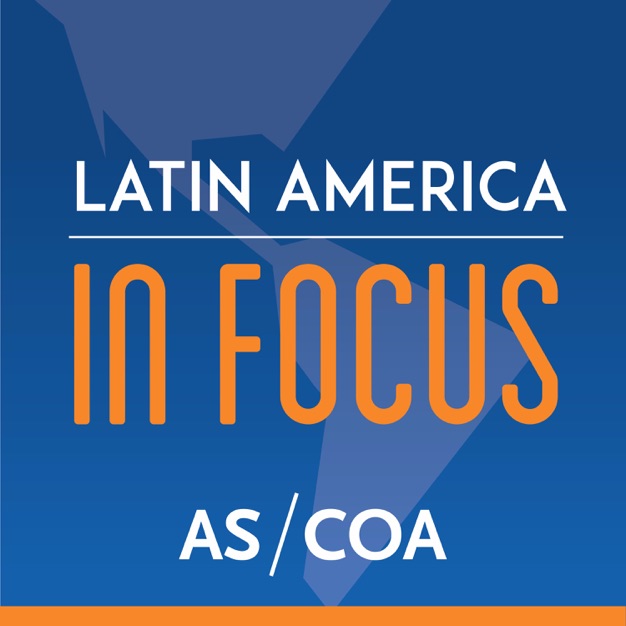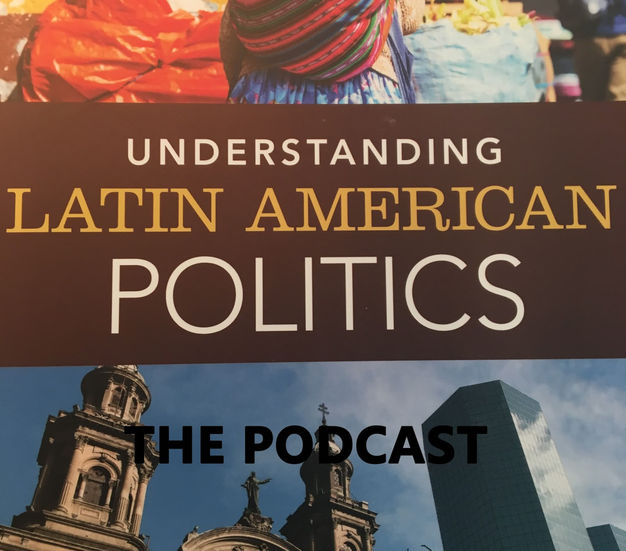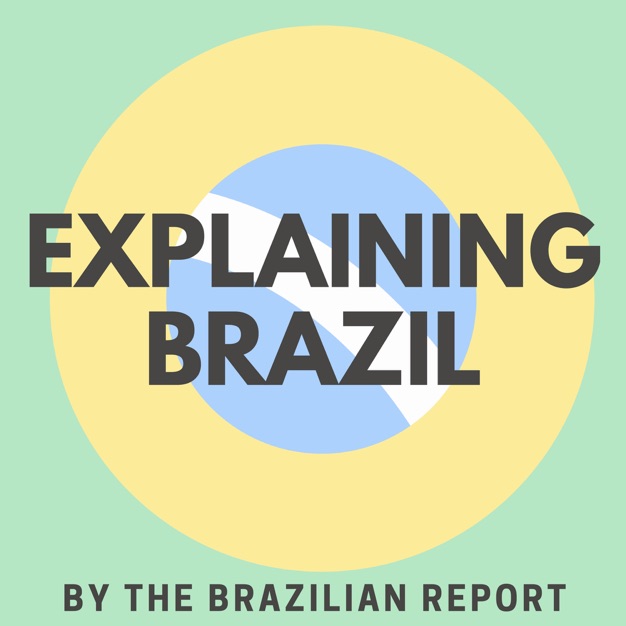
Deep South podcast
Americas Quarterly
A podcast focused on Latin American politics and economics hosted by Brian Winter, editor-in-chief of Americas Quarterly magazine and vice president of Americas Society/ Council of the Americas.
- 32 minutes 10 secondsA Critical Election in Ecuador
Nearly a year ago, Ecuador faced a surge of violence when drug gangs took over a TV station and kidnapped police, marking the country's worst security crisis. Since then, President Daniel Noboa has made modest progress, with homicides down 16%, but 2024 still ranked as Ecuador's second most violent year. Noboa also faced a severe energy crisis, with droughts leading to planned blackouts that hurt his previously strong public support. Despite economic challenges, including a potential recession, Noboa remains a leading candidate in the upcoming February 9 elections, narrowly ahead of correísta candidate Luisa González. As Ecuador prepares to vote, we analyze the fight against organized crime, the economic situation and how either Noboa or González might handle a potential Trump presidency in the U.S. Our guest is Sebastián Hurtado, the co-founder and CEO of Prófitas, a political risk consultancy based in Quito.
23 January 2025, 5:00 pm - 25 minutes 13 secondsChancay Port and the China-U.S. Battle in Latin America
Peru quickly became one of the first countries in the cross hairs of the incoming Trump administration because of the recently-inaugurated Chancay port, which is run by the Chinese company Cosco Shipping. In this episode, we ask Alfredo Thorne, a former finance minister of Peru, what is special about the Chancay port, what this project tells us about China's plans in Latin America and how Peru is likely to navigate the tension between the U.S. in China for which the country has become a lightning rod.
9 January 2025, 7:00 pm - 33 minutes 35 secondsWhat to Expect from Latin America’s Economies in 2025
In this episode we look at what to expect from Latin America’s economies in 2025. Ernesto Revilla, chief economist for Latin America at Citigroup, evaluates the impact of Donald Trump’s return on the region’s economic outlook, his predictions regarding trade tensions, and how ideological affinities between presidents could affect economic policy. He also analyses the health of Latin America’s economies independently of Trump’s decisions, focusing on Mexico, Argentina and Brazil, but also commenting on Andean nations, as well as Costa Rica and the Dominican Republic.
18 December 2024, 12:00 pm - 33 minutes 27 secondsMexico Under Pressure, Not Only from Trump
Since Donald Trump’s election there have been fireworks between him and Mexico’s President Claudia Sheinbaum. President-elect Trump has threatened to impose tariffs of 25 percent as two leaders embark on what are likely to be contentious negotiations over migration, border control and trade. In this episode we discuss the potential consequences for Mexico and what is Sheinbaum’s strategy. We also assess the current health of the Mexican economy as the president marks two months in office. Our guest is Valeria Moy, director of director of the Instituto Mexicano para la Competitividad, a think tank based in Mexico City.
5 December 2024, 6:00 pm - 31 minutes 8 secondsLatin America Prepares for Trump 2.0
Donald Trump’s second presidency will likely bring an even stronger focus on Latin America than his first term did. Trump talked often about Latin America in the campaign, mainly through the lens of immigration and trade. In this episode we explore the possible consequences of his administration for the region. What could happen to Mexico-U.S. relations, as the two countries prepare to review the USMCA trade deal? How is Trump likely to act regarding Venezuela? What does his election mean for the right in the region? And how will the U.S. address China's growing presence in the region? Mauricio Cárdenas is a former finance minister of Colombia and a professor at Columbia University's School of International and Public Affairs.
14 November 2024, 5:00 pm - 28 minutes 12 secondsLula and Brazil’s “Big Center”
Brazilian President Luiz Inácio Lula da Silva has an approval rating of about 50%. Unemployment in the country is at its lowest level in a decade and the economy is expected to grow about 3% this year, beating forecasts from just a few months ago. But despite all that, in recent mayoral elections across the country, Lula's Workers’ Party (PT) finished ninth in the number of mayors elected. The big winners were politicians from the centrão, the so-called big center, a coalition of parties that range on the ideological spectrum from the center to the center right and right. These are also the parties that wield control in Brazil’s Congress. In this episode, an analysis of what these results suggest about Brazilian politics today, why the economy is seeing improvement and what is impacting growth potential. Our guest is Christopher Garman, managing director for the Americas, Eurasia Group.
31 October 2024, 7:00 pm - 21 minutes 57 secondsLatin America’s “Food Paradox”
Latin America is the world's breadbasket. The region is now the source of more than 60% of the world’s soy, almost half its corn and more than a quarter of its beef. At the same time, about 28% of people in Latin America and the Caribbean don’t have enough food for themselves. On today’s podcast, we’ll explore Latin America’s so-called “food paradox.” Why is it that as the region produces and exports more food than ever, it’s also having trouble feeding its own people? Our guest is Brandee Mchale, Head of Community Investing and Development at Citi and President of the Citi Foundation. She discusses what is causing this paradox and how the private sector is implicated in solving it.
24 October 2024, 5:00 pm - 30 minutes 23 secondsThe Conservative Shift in U.S. Latinos
Although Democrats still lead among Latinos, Republicans have grown their share of support among that community in the last two elections. Looking ahead to the upcoming contest between Donald Trump and Kamala Harris, we discuss some of the reasons for that shift, the long and little-known history of the Latino population in the United States and how economic and social issues shapes their political views. Marie Arana, author of LatinoLand: A Portrait of America's Largest and Least Understood Minority, argues that Democrats and politicians of all stripes are just beginning to understand them.
10 October 2024, 4:00 pm - 36 minutes 10 secondsMexico: Claudia Sheinbaum and the Shadow of AMLO
Claudia Sheinbaum will take office as Mexico's new president next week, on October 1, 2024. Often described as a technocrat, she also supports some of current President AMLO's more controversial policies, such as the judicial reform that was just approved. In this episode Vanessa Rubio, a professor at the London School of Economics and a former senator and deputy minister, shares what she expects from Sheinbaum's government. Rubio argues her administration will take shape as a new blend—one that could be deemed “techno-populist.”
26 September 2024, 5:00 pm - 33 minutes 44 secondsAn X-Ray of Javier Milei's Argentina
Javier Milei has so far succeeded in making drastic changes to Argentina's economic policies. In this episode we evaluate what has worked and what hasn't, and who have been the winners and losers. Milei's deep spending cuts have produced in the first 5 months of 2024 a primary fiscal surplus of 1.1% of GDP and inflation is down to about 4% a month. Poverty however continues to rise and the IMF projects an economic contraction of 3,5% for 2024. What do these results amount to in terms of real improvement to the economy? What challenges remain? And what are the most likely political and economic outcomes of Milei's policies? Our guest is Eduardo Levy Yeyati, a former chief economist of the Central Bank of Argentina, and currently a professor at the School of Government at Torcuato di Tella University in Buenos Aires. He also discusses the need for a revival of centrist politics in Latin America.
12 September 2024, 5:00 pm - 36 minutes 23 secondsWhat Kamala Harris Would Mean for Latin America Policy
The entry of Kamala Harris in the U.S. presidential race has completely transformed the election. In this episode we ask what we can expect from her Latin America policy were she to win in November. How do leaders in the region perceive her? What are her views on migration? What can we learn from her record as Vice-President, tasked with the challenging issue of addressing the factors that make people from Central America migrate to the U.S.? What is her stance on trade, and how might she handle the 2026 review of the United States-Mexico-Canada Agreement (USMCA)? Our guest is Roberta S. Jacobson, a former State Department official.
29 August 2024, 6:00 pm - More Episodes? Get the App
Your feedback is valuable to us. Should you encounter any bugs, glitches, lack of functionality or other problems, please email us on [email protected] or join Moon.FM Telegram Group where you can talk directly to the dev team who are happy to answer any queries.
 Latin America in Focus
Latin America in Focus
 Understanding Latin American Politics: The Podcast
Understanding Latin American Politics: The Podcast
 Caipirinha Appreciation Society
Caipirinha Appreciation Society
 Explaining Brazil
Explaining Brazil
 Latin America Today
Latin America Today